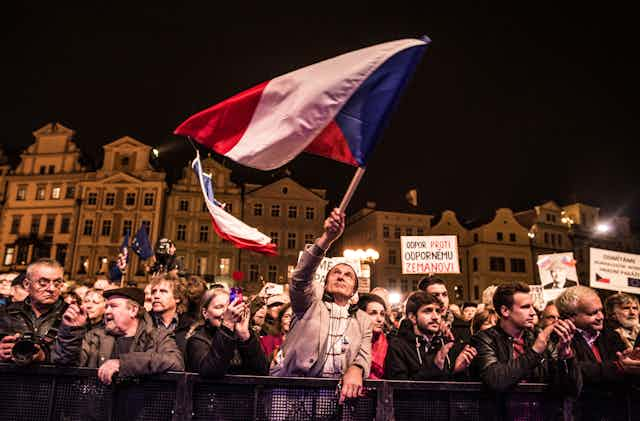The year 2016 may well be remembered as a global turning point. The perennial conflict between right and left has been replaced with something far more extreme. As social psychologist Jonathan Haidt puts it: the defining struggle of the times pits liberal globalists against illiberal nationalists.
In the West, there have been occasional attempts to talk to the supporters of illiberal nationalists in order to identify what has led them down a certain path. As the late US psychologist Marshall Rosenberg argued, talking to frustrated people and asking them what they need is the only efficient way of resolving intractable conflicts.
Regrettably, exactly the opposite is happening in Central Europe – and the Czech Republic is an interesting case study. Recent vociferous protests seem to indicate the existence of an intractable conflict in Czech society. It’s a conflict which no one is attempting to address.
There is a major difference culturally and economically between the city of Prague and the rest of the Czech Republic. The former is home to one million of the country’s 10m inhabitants but accounts for about 25% of its GDP.
The capital is different politically, too. Locals are becoming increasingly opposed to Miloš Zeman, the populist Czech president, who is a Donald Trump-like character. But their anger is not reflected in the rest of the country.
Zeman was voted into post in January 2013 by voters keen to punish the austerity-orientated right-of-centre government of Petr Nečas, which was in power at the time. Although his position is ceremonial, Zeman has spent the past few years boosting his popularity by making highly controversial and alarmist statements. He has developed a strong line in whipping up nationalism and xenophobia. And it works. At the end of September 2016, 57% of Czechs said they trusted him.

Just like in the West, economic inequality is the cause of political conflict. It seems tragic that the middle classes of the capital don’t seem to realise this. They have been taking to the streets to demonstrate against Zeman, little realising that the rest of the country is looking on in disdain.
A squabble too far
The latest flare up began when the Dalai Lama was invited to Prague to attend Forum 2000, an international conference which was co-founded by the late President Václav Havel in 1997. The aim of the conference was to discuss globalisation and “difficult issues that are key to the future of civilization”.
Unlike in Havel’s times, the current Czech government refused to receive the Dalai Lama. Its attempts to cultivate economic links with China were deemed to be too important to risk offence by greeting the Tibetan leader.
There was one exception – the Catholic culture minister Daniel Herman, who defied his fellow ministers’ boycott to meet the Dalai Lama. A reaction followed almost immediately. The government, president and parliament issued a sycophantic pro-Chinese public statement, in which they dissociated themselves from the meeting.
Then Zeman took further revenge against Herman by withdrawing an award that was meant to be bestowed on his uncle, an 88-year-old holocaust survivor, on the Czech national day in October.

This act prompted a wave of passionate protests from Zeman’s Prague-based critics. A group of activists even took over a TV chat show and, with the consent of the presenter, took turns to condemn the president in the strongest of terms. And on the Czech national day, thousands demonstrated in the capital.
Both events have been met with scathing criticism on social media. Zeman’s supporters say he understands their problems and defends the national interest.
Mutual contempt
It is beyond doubt that the Czech president divides society, encourages conflict and provokes extraordinarily passionate reactions from both mutually hostile camps.
Many Czechs have become obsessed with this issue to the exclusion of anything else. That might seem a grossly overblown response to petty personal politics, but the Zeman scandal is part of a broader, and very serious, issue.
While the Prague middle classes organise passionate demonstrations against the president, criticising his excesses, it does not occur to them that it would be perhaps much more effective if they actually ventured out into the Czech countryside and asked Zeman’s admirers about why they are so frustrated – and how they can be appeased.
There seems to be no dialogue between the two sides in the Czech Republic, so social divisions only deepen. And as the two sides drift further apart, populist politicians like Zeman only profit.

